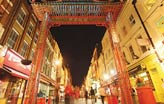Web Comments
Chinese hospitals scare Indians
Updated: 2011-05-31 16:04
By Geeta Kochhar (chinadaily.com.cn)
"You are unwell, let's go to a hospital." When I hear these words my body chills and misses heartbeats.
Chinese medicine is known for all its goodness around the world and yet the thought of going to a hospital is scary for most Indians. Unlike the Indian traditional medicine (ayurvedic medicine), which is based mainly on plants and minerals, Chinese traditional medicine uses a lot of animal extracts in addition to other herbs, although the scientific theory seems to be similar. It is probably the philosophies of treatment that differ in some ways. However, these days there is a lot of stress on Western medicine (called allopathic medicine in India) in both countries.
My first encounter with a Chinese medical treatment was in December 1995. I was studying at Liaoning University and due to extreme cold was caught by an acute sinus attack. I had to see a doctor, and the best and inexpensive way was to visit the university health center.
While I walked toward the health center, every other person was walking out with a drip of glucose bottle. Is this the only treatment in the health center, I wondered as I took the courage of entering the main gate. I was welcomed to queue to take a number (挂号 guahao) and explain to which doctor I need to pay a visit. I was referred to a general physician.
The room - outside and inside - was lined up with people of all sorts. No courtesy of waiting for a patient to see the doctor in private. I waited and waited until the doctor called me inside. As the doctor posed questions about the problem, I could feel the uneasiness of people around me. As the doctor intended to do a chest check-up, I was here for a rude shock. What? A check-up in front of everyone? Is this the way it works in China? No way, I screamed. I needed a private conversation with the doctor. They all laughed and I persisted to throw everyone out of the room. The doctor then prescribed some tests.
My next shock was not very far. As I walked into the test room to do the blood test the doctor had prescribed, I happened to meet a nurse who wanted to take the blood from the ear to see if the infection was severe: blood sample from ear to check infection of throat and ear, I was learning for the first time in more than 20 years.
I had to agree that the medicines worked. The best part was the humble and cordial way the doctors treated a foreigner with a sense of special care. That was then.
Even in those days I and my other Indian friends used to laugh about the scary ways of getting an injection in a Chinese hospital. We termed it as a style of giving injection to a horse in India. Many of my other friends had to endure this trauma due to complete health check-ups that were a must for foreign students at universities of Beijing.
Another strange feeling I got was when a friend of mine got infected by chicken pox, a disease lesser known in China. It was in 1996, and my friend had to be placed in a special infectious disease hospital of Beijing. No one was allowed to visit him and he had a telephone connected to talk to us. I still remember his loud cries when nurses gave him injections and forced him to take the medicines.
E-paper

Tapping into the future
Foreign companies are investing in China's water industry as many predict a growing profit margin.
Headhunters ride on growth
Commercial property rides wave
Learning from the past
Specials

Cuisine central
London's Chinatown is helping diners appreciate full palate of Chinese food

Tying the knot
Danish couple's high-end macrame export business takes off in the mountains of Yunnan.

Truly a super woman
Li Yuchun first came to prominence in 2005 as the Super Girl winner, and since then has become an international star.
